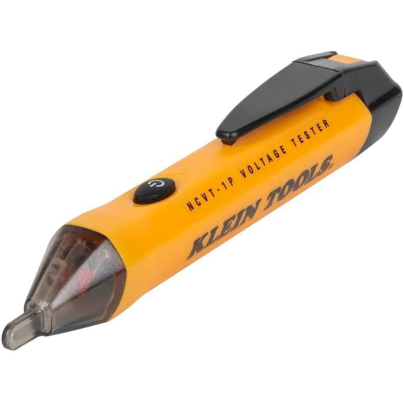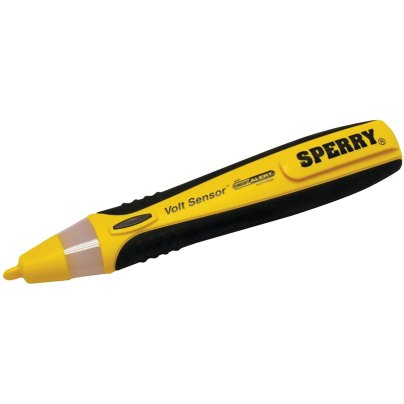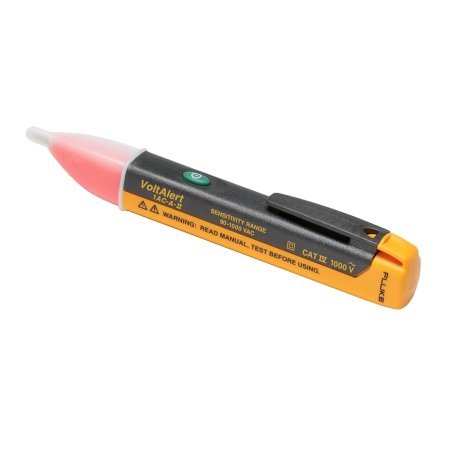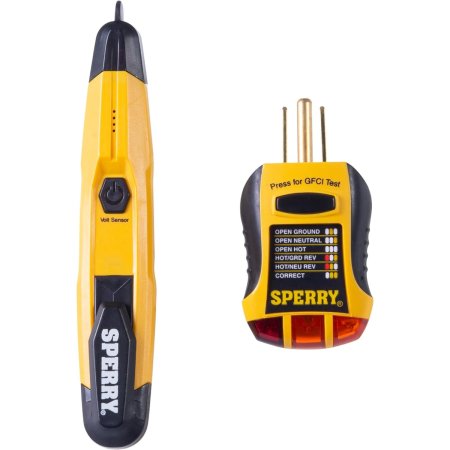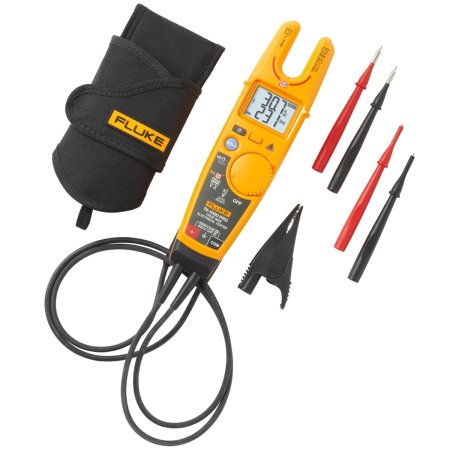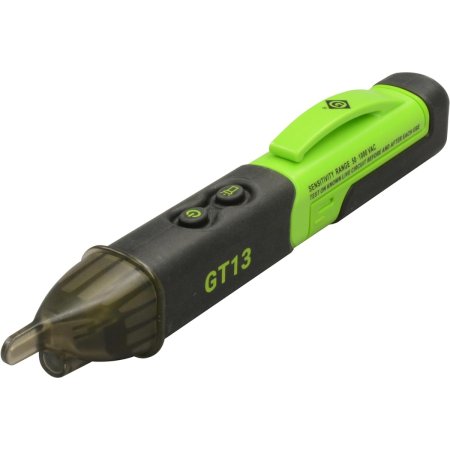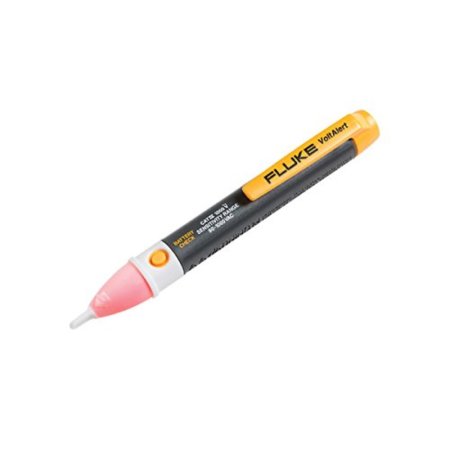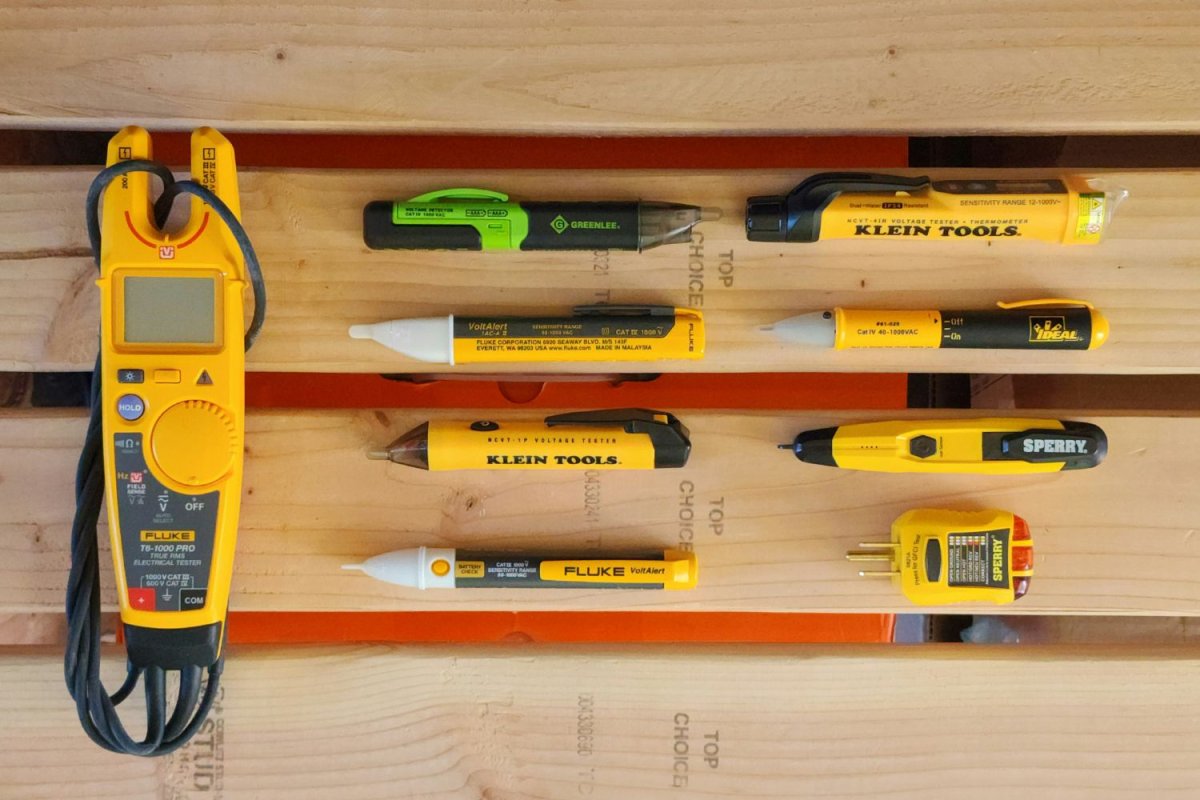
We may earn revenue from the products available on this page and participate in affiliate programs. Learn More ›
When working on electrical projects at home, it’s important to have tool box essentials on hand, including a voltage tester. We recently tested several voltage testers to identify eight models that can improve efficiency and help prevent electrical shocks.
Voltage testers allow users to quickly, easily, and safely check for power. With numerous types of voltage testers available, it’s important for consumers to know what to look for in a voltage tester and how to determine which one best suits their needs. Our favorite is the Fluke 1AC II VoltAlert Non-Contact Voltage Tester. It has a user-friendly design featuring a self-testing indicator, quick power alert, secure clip, and adjustable beep settings.
We conducted hands-on testing in situations DIYers are likely to encounter and consulted industry professionals and experts from Frontdoor.com to compile this list of the top voltage testers by category.
- BEST OVERALL: Fluke 1AC II VoltAlert Non-Contact Voltage Tester
↓ Jump to Review - RUNNER-UP: Klein Tools NCVT-1 Non-Contact Voltage Tester Pen
↓ Jump to Review - BEST BANG FOR THE BUCK: Sperry Instruments Non-Contact Voltage Tester
↓ Jump to Review - BEST MULTIMETER: Fluke T6-1000 Pro Electrical Tester
↓ Jump to Review - BEST MULTIFUNCTION: Klein Tools NCVT-4IR Non-Contact Voltage Tester Pen
↓ Jump to Review - BEST WITH LIGHT: Greenlee Non-Contact Self-Test Voltage Detector
↓ Jump to Review - BEST POCKET-SIZE: Ideal Industries 40-1000V AC Volt Aware NCVT
↓ Jump to Review - ALSO CONSIDER: Fluke 2AC Non-Contact Pocket-Sized Voltage Tester
↓ Jump to Review

Product Comparison
| Design | Testing Range | Actual Size | |
| Fluke 1AC II VoltAlert | Pen | 90 to 1,000V | 6 inches long by 0.625 inch wide by 0.75 inch deep |
| Klein Tools NCVT-1 | Pen | 50 to 1,000V | 5.5 inches long by 0.7 inch wide by 1 inch deep |
| Sperry Instruments Non-Contact | Pen/outlet | 50 to 1,000V | 3 inches long by 1.5 inches wide by 1 inch deep |
| Fluke T6-1000 Pro | Multimeter | Up to 1,000V | 11 inches long by 3 inches wide by 2 inches deep |
| Klein Tools NCVT-4IR | Pen | 12 to 1,000V | 6.25 inches long by 1 inch wide by 1 inch deep |
| Greenlee Non-Contact Self-Test | Pen | 50 to 1,000V AC | 6 inches long by 0.75 inch wide by 0.75 inch deep |
| Ideal Industries 40-1000V AC | Pen | 40 to 1,000V AC | 5.75 inches long by 0.625 inch in diameter |
| Fluke 2AC Non-Contact | Pen | 90 to 1,000V | 5.75 inches long by 0.75 inch in diameter |
Our Top Picks
Below, DIYers will find details about some of the best voltage testers on the market—all from trusted brands that produce quality electrical tools, all of which have been put through their paces with our hands-on testing.
Best Overall
Fluke 1AC II VoltAlert Non-Contact Voltage Tester
Product Specs
- Design: Pen
- Testing range: 90 to 1,000V
- Actual size: 6 inches long by 0.625 inch wide by 0.75 inch deep
Our Ratings: Portability 5/5; Durability 5/5; Usability 5/5; Value 5/5
What We Like
- Easily fits inside a tool bag or pocket
- Self-test indicator prevents incorrect readings
- Audible alert indicates active circuit detection
- Automatic shutoff conserves battery
What We Don’t Like
- Adjusting beep and silent modes takes practice
The Fluke 1AC II noncontact voltage tester is a quality pen tester from a leader in the electrical testing industry. This tester can detect voltage between 90V and 1,000V while fitting comfortably in a tool pouch or a pocket. When it detects voltage, the tip glows bright red as an alert.
The Fluke 1AC II voltage tester features a continuous self-test indicator that flashes red to alert that it’s working. It also has a loud, audible beep to indicate it detects power, but there is a disable function for quiet environments. This Fluke voltage tester runs on two included AAA batteries and features an automatic shutoff to save battery life.
We found that this voltage tester was extremely easy to use. The self-testing indicator is a handy feature, as it constantly alerts users that the tool is, in fact, working. We noted that it also alerts to power quickly when turned on (some models take a few seconds). It fits well in the tool bag, and the sturdy clip locks on easily. Turning it on with or without the beep (it depends on how long the button is held down) took some getting used to, but it didn’t impact the tester’s functionality.
Get the Fluke VoltAlert voltage tester at Amazon or Lowe’s.
Runner-up
Klein Tools NCVT-1 Non-Contact Voltage Tester Pen
Product Specs
- Design: Pen
- Testing range: 50 to 1,000V
- Actual size: 5.5 inches long by 0.7 inch wide by 1 inch deep
Our Ratings: Portability 5/5; Durability 4/5; Usability 5/5; Value 5/5
What We Like
- Indicator shows charge
- Auto shutoff saves battery
- Compact size
What We Don’t Like
- Battery cap is secure but doesn’t seal off completely
Klein Tools produces top-notch tools for electrical professionals, and the Klein Tools NCVT-1 noncontact voltage tester lives up to the company’s legacy. It can test for voltage between 50 and 1,000V of alternating current and fits nicely in a pocket or pouch.
The NCVT-1 voltage tester uses an easy-to-understand red-and-green indicator to alert the user to power: green for no power and red for voltage. It also beeps steadily when it detects voltage. It features an automatic shutoff to stretch battery life and a low-battery indicator that alerts when the included AAA batteries are about to run out.
While it might drain batteries faster than some other voltage testers, the constant green this tester emits when it’s on proved to be a nice touch during testing. It indicated that the model was working and slightly illuminated dark spaces, too. We also like that this tester is compact, measuring just 5.5 inches long, making it more than suitable for a toolbox or bag.
Also, the automatic shutoff turns off without a loud beep, saving energy and avoiding startling the user when working with an electrical device. Our only complaint is that while the tail cap that retains the batteries is secure, gaps around the cap prevent it from sealing completely.
Get the Klein Tools NCVT-1 voltage tester at Amazon or The Home Depot.
Best Bang For The Buck
Sperry Instruments Non-Contact Voltage Tester
Product Specs
- Design: Pen/outlet
- Testing range: 50 to 1,000V
- Actual size: 3 inches long by 1.5 inches wide by 1 inch deep
Our Ratings: Portability 5/5; Durability 5/5; Usability 4/5; Value 5/5
What We Like
- Identifies reversed wiring and circuit issues
- Tests GFCI outlets with one button touch
- Affordable plug-in outlet tester/pen tester combination
- Audible and visual indicators when outlet is energized
What We Don’t Like
- Pen tester is overly sensitive; a bit unreliable
For a reliable, value-minded voltage tester, the STK001 noncontact voltage tester from Sperry Instruments is worth a look. This pen tester comes with a plug-in outlet tester, allowing users to test wires and outlets with one kit.
The pen tester detects voltages between 50 and 1,000V. When it detects voltage, it will beep loudly, and the clear plastic housing of the bulb will flash red. It runs on one AAA battery (included) and has a low-battery indicator to ensure it’s working. The outlet tester will alert the user to voltage, open grounds, neutrals, hots, and reversed polarities. It can also test ground-fault circuit interrupter (GFCI) outlets to ensure they work properly.
Our assessment of the Sperry kit is that it offers much value for its price point. For a relatively low cost, consumers get two tools to detect voltage. The plug-in tester proved easy to use, and our testing of outlet wiring configurations was a breeze. Also, tripping GFCI outlets was simple, requiring just the press of a button. We found that the pen tester is extremely sensitive and occasionally alerts to a voltage that isn’t present, but at least it errs on the side of caution.
Get the Sperry Instruments voltage tester at Amazon or The Home Depot.
Best Multimeter
Fluke T6-1000 Pro Electrical Tester
Product Specs
- Design: Multimeter
- Testing range: Up to 1,000V
- Actual size: 11 inches long by 3 inches wide by 2 inches deep
Our Ratings: Portability 5/5; Durability 5/5; Usability 4/5; Value 5/5
What We Like
- Measures DC, AC, amperage, and resistance
- Performs touch-free voltage measurements
- Includes holster and alligator clips for portability
What We Don’t Like
- Noncontact voltage readings aren’t as accurate
Electrical professionals often need a fast way to test a wire and take measurements without finding a junction or outlet. The Fluke T6-1000 Pro electrical tester multimeter’s Field Sense setting detects and measures the voltage without disconnecting connections. Simply slide the testing fork over the wire, and the T6-1000 will report on its condition.
The T6-1000 features all the other common settings expected from a multimeter, including DC and AC, amperage, and resistance measurements. This durable voltage tester comes with alligator clips, swappable test leads, and a holster to keep it close at hand.
As a multimeter, the T6-1000 worked just as we expected, providing readings on voltage, resistance, amperage, and hertz (helpful for electrical motor service and other equipment). The fact that it can indicate the presence of voltage between the forks is a nice benefit, allowing it to serve as a noncontact tester and a standard multimeter. However, in our experience, the actual voltage readings weren’t nearly as accurate as those of the regular leads. For user convenience, it comes with a holster, swappable leads, and alligator clips for easy transport.
Get the Fluke T6-1000 voltage tester at Amazon.
Best Multifunction
Klein Tools NCVT-4IR Non-Contact Voltage Tester Pen
Product Specs
- Design: Pen
- Testing range: 12 to 1,000V
- Actual size: 6.25 inches long by 1 inch wide by 1 inch deep
Our Ratings: Portability 4/5; Durability 5/5; Usability 4/5; Value 5/5
What We Like
- Infrared thermometer detects between -22 and 482 F
- Includes noncontact voltage testing and temperature tests
- Low-voltage detection as low as 12V
- IP54 rating; resists dust and water penetration
What We Don’t Like
- Fairly bulky compared to other pen testers
For electrical work around equipment that runs a bit hot, such as boilers, furnaces, and industrial equipment, the NCVT-4IR voltage tester from Klein Tools is a smart choice. In addition to detecting voltages within a range of 12 to 1,000V, this model features a built-in infrared thermometer. The thermometer can detect temperatures between -22 and 482 degrees Fahrenheit, providing safe, hands-free temperature checks.
The pen tester features a two-color LED system: blue to indicate that it’s working and red when it detects voltage. The infrared thermometer has a built-in laser pointer that makes precise measurements easier. Both functions run on two AAA batteries, which have a built-in shutoff to preserve their life.
While the NCVT-4IR pen tester—an infrared thermometer and noncontact tester in one tool—is designed for HVAC mechanics and technicians, DIYers should also appreciate it. The laser was easy to use in testing, though slightly weaker than we would’ve liked. However, this model had the best range, detecting lower voltages than the others tested. It is fairly bulky compared to other pen-size models, but that bulk might be considered a benefit since this model is resistant to dust and water penetration and proved unaffected by either during our test.
Get the Klein Tools NCVT-4IR voltage tester at Amazon or The Home Depot.
Best With Light
Greenlee Non-Contact Self-Test Voltage Detector
Product Specs
- Design: Pen
- Testing range: 50 to 1,000V AC
- Actual size: 6 inches long by 0.75 inch wide by 0.75 inch deep
Our Ratings: Portability 5/5; Durability 5/5; Usability 5/5; Value 5/5
What We Like
- Rubberized grip provides comfortable, nonslip use
- Built-in flashlight
- Fits well in a shirt pocket or tool bag
What We Don’t Like
- Color-changing indicator preferable to rapid-flashing LED and beep
Folks who want to ensure they can see exactly where and what they are testing will want to consider Greenlee’s noncontact voltage detector. This model has a built-in flashlight that the user can turn on when needed to see into dark corners or spaces.
This model can detect voltage between 50 and 1,000V AC. In normal powered-on mode, it flashes red to indicate it’s working. Upon detecting voltage, the red LED flashes rapidly and the model beeps, indicating power is present. The automatic shutoff turns the pen tester off after 5 minutes of inactivity, and with its rubberized grip, holding onto it is a bit easier to manage.
During testing, we found quite a bit to like about the Greenlee. First, the rubberized texture makes holding this model comfortable and less likely to slip. Also, the flashlight illuminates darker spaces enough to find the wires, outlet, or device that needs testing. We particularly liked the size since it’s one of the most slender models going and fits well in a shirt pocket or tool bag. We would prefer that the LED light change color upon detecting voltage, but the rapid flash and beep work well.
Get the Greenlee voltage tester at Grainger.
Best Pocket-size
Ideal Industries 40-1000V AC Volt Aware NCVT
Product Specs
- Design: Pen
- Testing range: 40 to 1,000V AC
- Actual size: 5.75 inches long by 0.625 inch in diameter
Our Ratings: Portability 4/5; Durability 4/5; Usability 4/5; Value 5/5
What We Like
- Fits neatly in shirt/tool-bag pocket
- Twist-on/twist-off function
- Rubberized grip is comfortable
What We Don’t Like
- Flimsy clip could break
Whether it’s a spare to toss in a tool bag or the main voltage tester a technician keeps in a shirt pocket, the Ideal Industries 40-1000V AV Volt Aware NCVT is a worthy choice. This model isn’t much larger than a typical magic marker, so it fits easily within most clothing pockets and can even slip into a pencil pocket in a tool bag or belt.
This tester can detect voltage between 40 and 1,000V AC. It has a green steady light that indicates when it’s on and a red flashing light and beep that indicates when it detects electricity. The rubberized body prevents slipping out of the hand, and the silence/beep toggle button near the tip is easy to access and use.
We found it super handy to tote this tester in either a shirt pocket or the one on our tool belt because it’s compact and rounded, taking up less space than a square-cornered model. We also liked the twist-on and twist-off function for a more tactile response than pressing a standard on/off switch, and the rubber grip makes grabbing it out of a pocket a breeze. However, the pocket clip is flimsy, so should it break off, the cylindrical tester might easily roll off a table or shelf.
Get the Ideal Industries voltage tester at Amazon.
Also Consider
Fluke 2AC Non-Contact Pocket-Sized Voltage Tester
Product Specs
- Design: Pen
- Testing range: 90 to 1,000V
- Actual size: 5.75 inches long by 0.75 inch in diameter
Our Ratings: Portability 4/5; Durability 4/5; Usability 4/5; Value 5/5
What We Like
- Compact and thin for easy transport
- Visual indicators alert to the presence of power
- Always in “on” mode for easy use
What We Don’t Like
- No functional beep
While most pen testers will clip to a pants pocket or fit inside a shirt pocket, bulky models won’t feel comfortable to carry that way. Enter the 2AC noncontact voltage tester from Fluke. This pen tester measures just 5.75 inches long and 0.75 inch in diameter, so it can slide into a pocket with ease. It also weighs just 10.6 ounces, so it won’t feel heavy when clipped to a shirt.
The Fluke 2AC voltage tester detects voltages between 90 and 1,000V and glows red to indicate that it detects voltage. However, while the product description claims that the tester also beeps upon voltage detection, the model we used did not (some online consumers had the same complaint). The lack of an audible beep was somewhat of a letdown, as all the other models tested have that capability. But this model doesn’t have an on/off switch, so it’s always in “on” mode for easy use. And since there’s a built-in battery indicator and automatic shutoff, it should not drain its two AAA batteries.
Get the Fluke 2AC voltage tester at Amazon or Walmart.
Jump to Our Top Picks

How We Tested the Best Voltage Testers
We wanted to ensure we suggested only the best voltage testers, so we did our homework. We performed extensive product research and consulted experts like Chris Lozano, a master electrician with over 10 years of experience at Rev Electric in Sharon, Pennsylvania. He says that a voltage tester needs to be rated for the voltage you will be testing. “A residential household uses a 120/240-volt AC system, so a tester needs to be rated up to 250 volts AC.”
We initially tested each model on various household outlets and appliance wires, both plugged and unplugged. Each was also tested on a 240-volt (V) dryer outlet, except for the plug-in model, to verify their reliability and effectiveness. We assessed the models for compactness, ensuring they fit in both a tool bag and a shirt pocket, and measured their actual size for precise specifications. Models featuring extra tools like thermometers and flashlights were also examined to confirm their functionality.
To ensure our top picks were the safest and best, we consulted Terry Dussault, CEO of Yellowknife Consulting Services in Huntington Beach, California, and a safety expert with over 25 years of experience. Dussault recommends testers that feature noncontact voltage detection, audible alerts, and a broad voltage range to improve efficiency. He also emphasizes the importance of certification by recognized safety organizations like Underwriters Laboratories or Conformité Européenne.
Models that passed our tests were recognized for their strengths, while those that failed were removed, creating our list of top voltage testers.
| Testing Stats | |
| Products tested | 8 |
| Time spent testing | 8 hours |
| Tests performed | 5 |
| Price range | $18 to $280 |
| Portability | Durability | Usability | Value | |
| Fluke 1AC II VoltAlert | 5 | 5 | 5 | 5 |
| Klein Tools NCVT-1 | 5 | 4 | 5 | 5 |
| Sperry Instruments Non-Contact | 5 | 5 | 4 | 5 |
| Fluke T6-1000 Pro | 5 | 5 | 4 | 5 |
| Klein Tools NCVT-4IR | 4 | 5 | 4 | 5 |
| Greenlee Non-Contact Self-Test | 5 | 5 | 5 | 5 |
| Ideal Industries 40-1000V AC | 4 | 4 | 4 | 5 |
| Fluke 2AC Non-Contact | 4 | 4 | 4 | 5 |
What to Consider When Choosing a Voltage Tester
Here are the most important factors to consider when choosing a voltage tester, including designs and functions.
Design
There are three basic voltage tester designs:
- Pen testers are roughly the size and shape of a thick pen or marker. To operate, simply turn it on and touch the wire in question. Users can also place the tip inside an outlet to test for voltage.
- Outlet testers are about the size of an electrical plug and work by plugging directly into an outlet. They can test for voltage (and usually polarity, to check that the outlet is wired correctly), though they’re unable to test circuits outside of an outlet.
- Multimeters with voltage testers are the best of both worlds, though they’re significantly larger than pen or outlet testers. They have grooves or hooks to surround a wire and detect voltage as well as leads (the wires and points connected to the tester) for testing contacts like outlets and terminals.
Functionality
Generally, voltage testers are only useful for checking alternating currents, such as the electricity in a dwelling or commercial building. They don’t help detect the direct current in a vehicle.
But that doesn’t mean that all voltage testers are one-trick ponies. Some pen testers have built-in features like flashlights, measuring lasers, and infrared thermometers. Many outlet testers can alert the user if the wiring is backward. Multimeters can test for AC and DC voltage, resistance, amperage, and more.
Each user’s needs will determine the necessary functions for a voltage detector. To test a wire for power, a pen tester can do the trick without confusing buttons or switches. If tackling various electrical projects, a multimeter might be a real asset.
Lozano says that one of the best ways to get the hang of using a voltage tester is the “live-dead-live” test, which can ensure the testing equipment is working. “Take the meter to something you know is working to test if it is live, then turn it off to test if it detects it is dead,” he says. Finally, test it again on the live part. “That will tell you if the testers are working and if the meter is in the right setting.”
Compatibility
Voltage testers aren’t compatible with every electrical device a DIYer might encounter. Certain types of voltage, or voltages outside the range the tester can detect, won’t cause the tester to alert.
Pen and outlet testers are excellent for testing electricity within the home, including switches, outlets, and fixtures, but they’re typically useless for checking for issues with a vehicle’s electrical system. Many pen testers also have voltage working ranges—such as 90 to 1,000V—so some may not be able to detect low voltages.
If taking on electronic device repairs (computers, drones, or televisions, for example) or working on a vehicle, look for a multimeter with a built-in voltage tester. A multimeter can switch between alternating and direct current and test for resistance and amperage. An HVAC multimeter can check an HVAC system’s fuses, switches, and other components.
Longevity
For long-term use and durability, choose a voltage tester from one of the trusted manufacturers in the electrical tools industry. These companies specialize in creating electrical tools for pros, and their products are top-notch—many pros still use meters and testers they purchased decades ago.
Battery life is also a consideration. Many of the best voltage testers have automatic shut-off functions. If they don’t detect voltage within a certain amount of time (usually around 15 minutes), the tester will automatically shut off to prolong battery life.
FAQs
No, voltage testers and multimeters are not the same, though some multimeters feature voltage testers. Voltage testers indicate only the presence of voltage. Multimeters can test the amount of voltage, amperage, or resistance in a fixture or circuit.
Yes, voltage testers are safety tools, and they’re safe to use. They have insulation to protect against current transfer, so the tester can’t transfer electricity to the user’s body.
Most voltage testers feature battery indicators that automatically alert you to advise that the tester is working. Others might require you to activate the battery test. If unsure, check an outlet you know is working to ensure the tester is functioning.
Meet the Tester
Tom Scalisi is a full-time DIY and construction writer for many of the largest websites in the industry, including BobVila.com, This Old House, Family Handyman, and Forbes. He also owns and operates a pest control blog, RiddaBugs.com.

